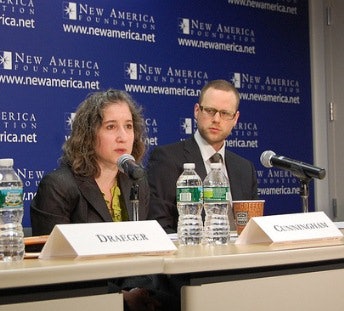 New America Foundation panel highlights student financial aid reform ideas.
New America Foundation panel highlights student financial aid reform ideas.In the latest release of policy papers recently commissioned by the Bill & Melinda Gates Foundation on ideas for overhauling the U.S. higher education financial aid system, the Institute for Higher Education Policy has identified 13 policy recommendations to achieve holistic financial aid reform. In Making Sense of the System: Financial Aid for the 21st Century Student by Mark Huelsman and Alisa F. Cunningham, the authors specify that reforms address four key areas — promoting early and coordinated college preparation, restructuring loan and grant programs, providing incentives for college completion, and reducing student debt repayment burdens.
The Washington-based nonprofit policy research organization, which focuses on “promoting access to and success in higher education for all students,” released the policy paper Monday as part of the Reimagining Aid Design and Delivery (RADD) initiative launched this past September by the Gates Foundation. Sixteen organizations, including think tanks and advocacy organizations, were awarded grants totaling $3.6 million.
Each paper is expected to “offer an original perspective on how financial aid can help more students be successful in college.” Foundation officials have said RADD’s purpose “is to spark a robust discussion about how financial aid can be used as a lever to increase student success, especially for low-income and middle-income students.” According to the Gates Foundation, the RADD project has two specific goals: “(1) to shift the national conversation on federal financial aid toward ideas that will make college more affordable while giving students the support and encouragement they need to earn their degree or credential; and (2) to seed the field with innovative policies that can make that happen.”
“We believe financial aid is an important piece of the completion puzzle,” Daniel Greenstein, director of Postsecondary Success at the Bill & Melinda Gates Foundation, said in a statement. “Not only does it open doors for students, but when done right, financial aid can also increase the likelihood that young adults complete their educations. There is a lot to learn and we’re excited about beginning the conversation and finding out what the research will discover.”
Within its report, the authors identify eight guiding principles IHEP contends should shape financial aid reform.
• The primary targets of need-based financial aid should be low-income students, but given rising costs, programs should be balanced to support reducing debt levels for middle-income populations as well.
• Financial aid reform should focus first on crafting policies that can more effectively help students gain access to and succeed in college, and then focus on the availability of public resources.
• There is room for simplification, efficiency and cost-effective reforms that may be accomplished without additional public investment.
• The earlier financial aid can be communicated or delivered, the more likely it is to benefit students.
• The financial aid system should better reflect the needs of non-traditional students.
• New federal financial aid programs should leverage, not replace, effective support from states, institutions and the private sector.
• Aid should be coordinated as a shared responsibility among students and families, states, institutions, the federal government, the K-12 education system and others that hold a stake in a more equitable and efficient financial aid system.
In addition to guiding principles and specific policy recommendations, the IHEP report includes a section that proposes a framework and suggests principles for assessing trade-offs and policy effectiveness. “One unique aspect of this paper that we really wanted to highlight and make widely known is the tradeoff aspects. … One of the things we wanted to do in this report was to get folks to make sure as they are proposing certain ideas they’re thinking about the tradeoffs along the way,” says Dr. Wendell D. Hall, the IHEP deputy director.
Other RADD grantees include the Alliance for Excellent Education, the Association of Public & Land-Grant Universities, the Center for Law & Social Policy, the Committee for Economic Development, the National College Access Network, the New America Foundation, The Education Trust and Excelencia in Education.















